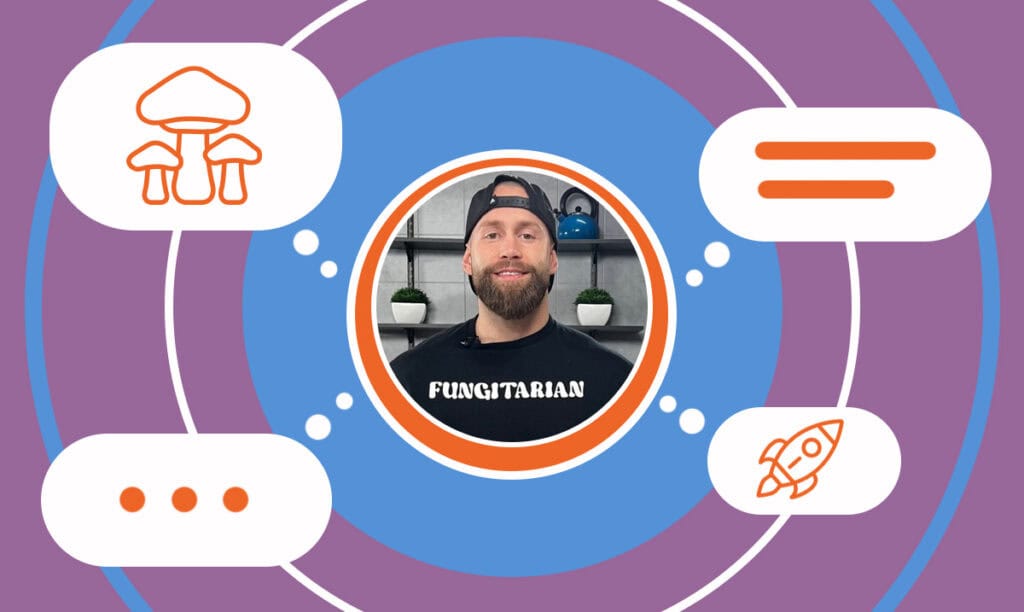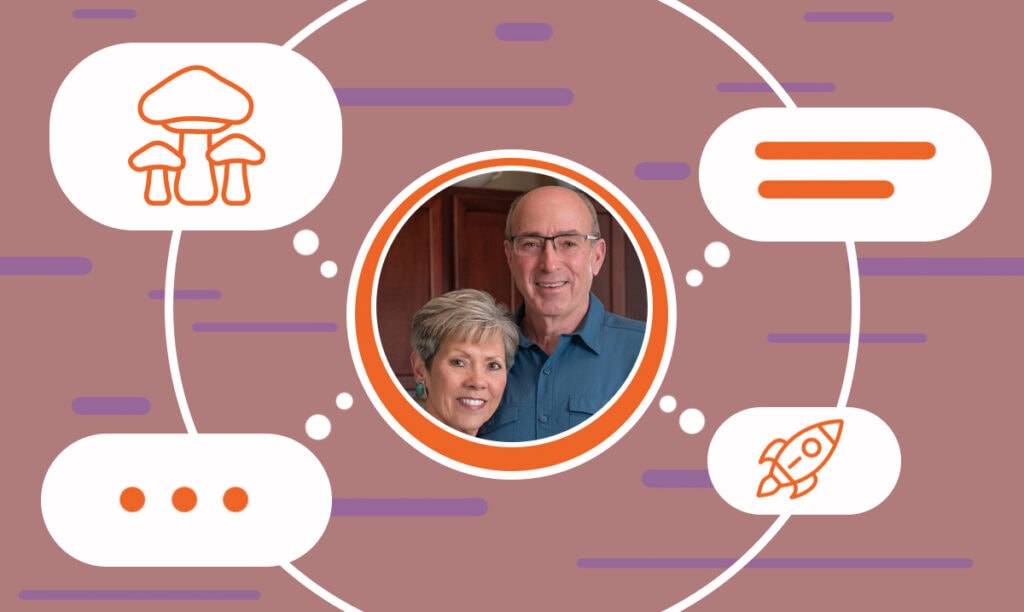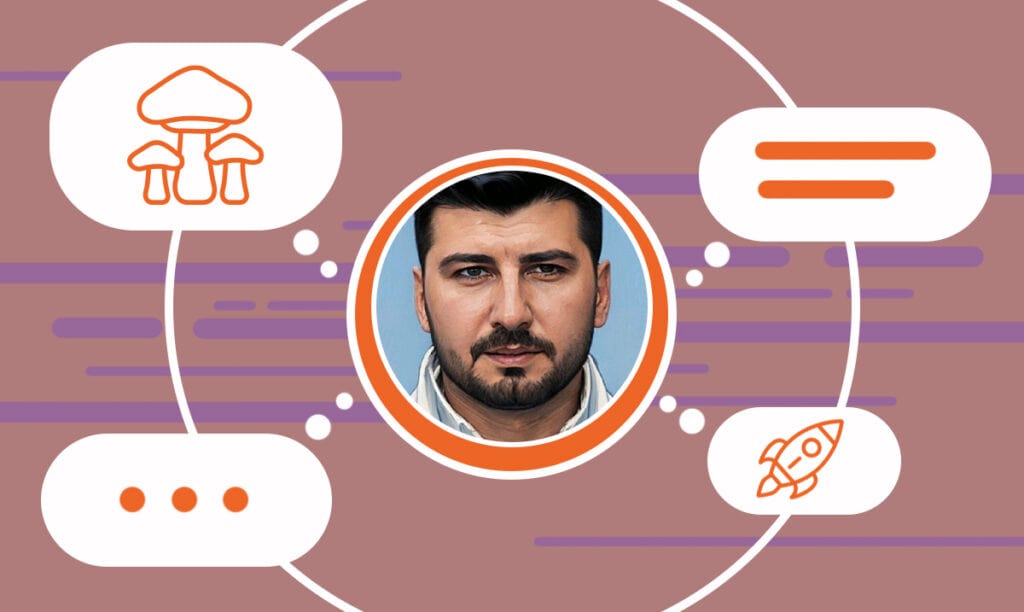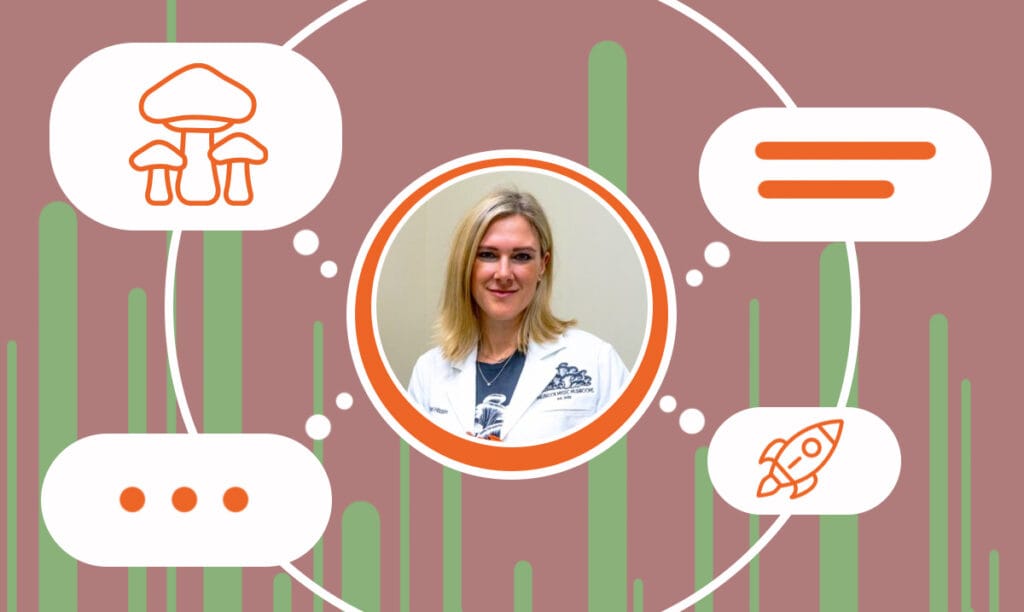In 2020, Lorian and John Roethlein founded Arizona Mushroom Co., an innovative venture that specializes in cultivating high-quality mushrooms andcre ...
How Sustainable Practices Propel Windy City Mushroom’s Success
Written by: Esther Strauss
Esther is a business strategist with over 20 years of experience as an entrepreneur, executive, educator, and management advisor.
Published on May 21, 2024

In today’s interview, we have the pleasure of speaking with John Staniszewski, co-owner of Windy City Mushroom. Established in 2020 in response to the pandemic, Windy City Mushroom aims to provide Chicagoans with sustainable and affordable gourmet mushrooms. During our conversation, John shares insights into the inspiration behind the business, the sustainable practices they employ, and the innovative products they offer. Tune in to learn valuable lessons on navigating the specialty food industry and scaling a mission-driven business.
Through Suffering to Finding a Purpose
SBS – How have your life experience and the loss of your family members led you to start a mushroom business?
John – I’ve been a personal trainer and nutrition coach for over 15 years. During that time, I’ve also been a caregiver for my entire family, who have all passed away by now. I also found mushrooms and saved myself, which led to this journey.
Seven years ago, my grandfather and my mom died, and I was heavily addicted to opiates, taking about 20 pills a day for about two years straight. I only had my grandmother left, and I had to choose between getting myself straight or not being able to help the woman who raised me. I was searching for answers, and I stumbled upon an article about the founder of AA and how a psilocybin mushroom trip cured him of his alcoholism and inspired the founding of AA. That was wild and crazy.
I knew that the only two things you can die from withdrawal from are alcohol and benzos. You can’t die from opiate withdrawal; it’s just terrible. I decided to give it a try and see what this could do. I just so happened to have a bag of mushrooms in my closet that my uncle gave me a year ago that I never touched. I was pretty scared of them at the time, and I forgot I had them. I ate about four grams that night, and I had a “come to God” moment, and God said, “I will save your life if you save the world with mushrooms.” I had no idea what that meant and where this would lead, but I said, “Okay.” When I woke up the next day, I never wanted an opiate again in my life. I found the magic cure. I did it again for the next two nights, and I stopped vaping and caffeine all in one week. My mind needed to be reset because it was so engulfed in all this other stuff.
Before opiates, I was an alcoholic and a cokehead. I’ve been doing drugs for years at that point, and I was trying to find ways to cope. I was in the nightclub scene and then got into the personal training. I always thank God for the habits instilled in me at a young age. My grandpa became a personal trainer at 65 and showed me the ways. Even though I had many bad habits, I had two really good ones — working out and eating well. I believe those two habits are why I made such a dramatic change — my body and mind were already stimulated by dopamine and good stuff from working out. I was already blessed with that discipline, so the moment my brain changed, I saw I no longer needed that other stuff.
I was a prominent personal trainer at this time. I had my own gym, and everything was going well. I ate the magic mushrooms and started telling everybody what happened. I trained doctors, lawyers, surgeons, and all sorts of people with different issues or autoimmune diseases. I suggested they try taking low doses of these mushrooms to see if the stress response will help. All of a sudden, we started putting psoriasis, eczema, herpes, and other issues in remission. My one client (a Navy veteran who had two service dogs) got off of seizure medication after ten years of taking it. His doctor called him, saying, “I don’t know what you’re doing, but keep doing it.”
This was about three months after I got sober, and I was dead set on my mission. I started reading, practicing, studying, and doing mycology every day. That’s all I did because, at that point, I realized that I wanted to change the world with psilocybin mushrooms. Yet seven years ago, it was completely illegal, and there was no way you could get it anywhere or push it out to people. At the time I started, it wasn’t illegal, but there was still a big stigma, and people thought I was crazy. They didn’t believe magic mushrooms were going to help people with depression or anxiety and all this stuff. So, I realized I needed to gain credibility by entering the mushroom world.
I picked one of the hardest mushrooms to grow — cordyceps. I started mass producing it and growing 20–30 pounds a month, which is crazy for these parts. I dedicated my life to it. I quit my personal training gig, got separated from my wife, moved out to the suburbs, and literally lived alone for three years and just grew mushrooms. My ex-wife was a very Christian, devoted woman, and she didn’t believe in the mission of me throwing away my successful 150,000–200,000-dollar-a-year training job to make no money and grow mushrooms, which I understand. However, I went on my path, and I knew that if I could slowly start this and understand it, I could get to new levels. I saw the industry trickling around me, and I realized this wasn’t a business— it would be an industry.
At that time, I had my farm going and was selling online. It was February 2020 (one month before COVID) when I bought mushroom farm equipment in Mississippi for $60,000. I brought it home and was planning to find a place, set it up, and start growing. Then COVID came, and everything shut down. Luckily, I had a friend who allowed me to store it all up at his horse farm out here in the suburbs.
I went back to the drawing board, and one day, a friend of mine told me there was a mushroom farm down the street from my gym. I didn’t know about it even though I’ve looked everywhere for those farms. Lo and behold, my now partner (Guy Furman), a shrimp and mussel farmer, switched to mushrooms because he thought they would be lucrative but didn’t know anything about mushrooms. He had a bit of a mushroom growing going on. I needed more space, so I approached him with the idea of teaming up and growing other types of mushrooms and helping him with the mycology for his business.
We partnered up on that, and together, over a year, we kept building up the business, getting better at growing the mushrooms, and going back and forth on the idea that we both agreed upon — to get America up to 5x per capita of mushroom consumption. In China, it’s 30x per capita; in Europe, it’s 10x per capita; and in America, it’s 2x, but that’s only because not many are growing the gourmet mushrooms we’re growing. We realized that if we could manufacture the process, we’d make it at a commodity-level price point, and then everybody could get superfoods into their diet. At that point, I planned to start a medicinal mushroom company using cordyceps, Turkey tail, Lion’s mane, and others, but something inside told me to grow food for the people. What do you need in this world? Do you need supplements? They help, but you need food. There’s no way around it. You need food, and I realized this was the last new food that would be put onto this planet and be readily available at grocery stores. You’re not going to get a new cucumber. You’re not going to get a new fruit.
My partner is a high net-worth individual, and he and I have put every last dollar that we own into this thing and moved from our 10,000-square-foot facility to a 50,000-square-foot facility. We grow everything in 8×20-foot shipping containers vertically stacked on each other. We control the CO2, the temperature, and the humidity levels from our phones. To drive down the cost of the mushrooms, we manufacture the entire process. We get byproducts (such as hardwood and soy hull) from other industries. We then put those into a bagging machine that fills the bags with a water ratio of 60:40. Those bags then get put into our autoclave sterilizer. That autoclave sterilizes the bags at 240 degrees for 4–5 hours a day. That then gets put into our clean room. In the clean room, those bags with the substrate the mushroom grows on get inoculated with about 6oz of mushroom mycelium (the precursor to mushrooms). Those grains of mycelium eat that whole bag over three to four weeks. We go from bag production to clean room, incubation, and grow rooms — all in-house. It’s a full circle.
Balancing Affordability and Quality
SBS – How do you ensure the product is affordable and high-quality?
John – Because we manufacture this way, we can get it to this price point, but the one tricky part I get in this whole thing is that you have to pay to play to get into the stores. So, by the time it gets to the grocery store, I’ve got it down cheaper than anybody else in the country, but I still want it more affordable, and I’m working on it. Right now, I have a $5 price point on Oyster and a $7 price point on Lion’s mane per pound. I have always believed in that business model. I believe in the 80/20 principle. I’m in the 20%, but 80% of the population needs affordable, low-cost, quick, easy, and convenient things. We realized that branding will set us apart, and we use the term fungitarian. I have it on my shirt.
Meaning and Purpose of Fungitarian
SBS – How did you come up with that term?
John – It was my idea and that of my coworker Matt Lopez. Because I’m a nutritionist, I think everybody needs an identity when they eat food. There are pescatarians, carnivores, and vegetarians, but I wondered what mushroom people were. Fungivores? My buddy said fungitarians, and we went with that.
Ideally, I’m trying to expand fungitarian past our food brand and turn it into a way of being and a way of living, focusing on eating real food but incorporating two cups of mushrooms into your diet daily because mushrooms, proven through NIH papers, will reduce your chance of cancer by 45%. Mushrooms have the highest concentration of vitamin D out of any produce that you can get your hands on. Mushrooms are also the most digestible fiber on the planet, and they’re also a complete protein. They’re low in calories and fat. People are out of vitamin D because everybody sits inside all day. I get my vitamin D and stay tan because I go outside all the time (and I eat a lot of mushrooms).
Even while doing this interview, I’m sitting on a big ball. I’ve been a movement coach for the last six years, and I’m trying to get people to understand that they’re in pain because they don’t move. It’s what you do 90% of the day. I don’t care if you go to the gym in the morning, but if you then go to the car that goes to the office, then go back to the car, then go back to the couch, then go back to the bed, you’re going to feel terrible.
I’m trying to create education and understanding behind a lifestyle of fungitarian as someone who has chosen mushrooms as a staple of their diet for their nutritional benefits, sustainability, and flavor. Whether you eat meat or plants, you join the fungitarian family. I’m bringing people from all walks of life to incorporate mushrooms and movement into their lifestyle because those are the two secret sauces everybody needs to feel and be happier. Everybody needs to play in a day, and they need to eat real food.
We had a restaurant that wanted some mushroom slice dishes that they could put on their menu. They backed out of it, and we were stuck with all these mushrooms in vacuum-sealed bags. That was also when we moved facilities and started selling at farmers’ markets. I didn’t know how to get others to prep, cook, and eat fresh mushrooms like I do, so we needed a simple solution, and I remembered those packs of mushrooms. I took a marker and wrote “Marinara,” “Ragout,” and “Mediterranean” on the bags. I brought a pan and started cooking them at the farmers’ markets. Suddenly, those bags started moving faster than any fresh mushrooms I’ve ever sold. What we nailed is texture. Everybody talks to me about the texture of mushrooms. We take the stems vs. the capsule, slice them at a specific thickness, cook down the stems, and then blend the caps. So, you have this meaty pulled pork-ish type texture.
The dishes we originally made were for a fancy restaurant and were not something most people would care about. I knew we needed to make it for moms and kids, so we made Taco, Pasta Sauce, Asian/Thai Chili, and Barbecue, and we had the Original. You could have five meals for five nights of the week, hot and ready in five minutes. Over the last two years, we’ve been pushing it out at farmers’ markets, co-ops, and little places.
Over the last six months, we’ve had big strides because my goal with fungitarian was to get it to the school systems, and yesterday, I just had my first order to Chicago public school systems for 3,200 pounds of mushrooms. That’s my whole focus — start with the kids, and then it’ll get to everybody else. I also got a deal with a 70-chain grocery store out here, and they’re carrying fungitarian now. I got an offer from Sprouts when I went to Expo West (Sprouts has about 400 grocery stores on the West Coast).
We popped off just recently, and the funniest part of this, from the business side, is me wearing multiple hats. What hat do you want me to wear? Do you want me to wear the sales hat, the marketing hat, the grower hat, the advertising hat, the driver hat? We did this. We got a product in the grocery stores with no money, advertising budget, or market. All we did was believe in it, push it, and get people to taste and try it. We just made a healthy, good product that couldn’t be denied, and it was so good and so much at the right price point that people couldn’t resist.
My facility is designed to grow a million pounds a year. We’re at half capacity right now, so I will add more containers as we go on. I potentially have a deal with 580 public schools in Chicago to put mushroom burgers on their menu as well. I just did a cooking class with them last week. I’m also working with Quest Food Management Services, which supplies colleges throughout the States, such as Urbana-Champaign, Ohio University, and Indiana University. They’re going to be bringing on fungitarian in September.
Right now, our mission is to keep expanding and growing and then open other mushroom farms in Florida and the Southwest. We want to create local mushroom farms down there but then take fungitarian as a national brand because then I can outsource it and use it that way.
As of last week, we finally hit profitability after four years of burning money, and we did it with a bang — we got about $30,000 over what we needed to hit. It was a blessing for the first time not to have to sweat anymore, not to figure out who would pay the bill next month and where this money would come from. It was by the grace of God. We have just been blessed with random people and friends who were generous. I thank my ancestors daily, and I truly believe they are around me 24/7. I’ve learned in this life that life happens for you, not to you, and you can learn to accept that life serendipitously works together to help you if you push out and be the change you want to see in the world. That’s really what I’m trying to convey to other people. The sky’s the limit. I’ve got three different grocery stores on the line. I just got in all Midwest Whole Foods stores.
I’ll fly out to PsyCon (Psychedelic Conference) next week. I go up after Lamar Odem, and we will deliver a presentation that the world can’t change just with psilocybin; it needs health and fitness (food and fitness combined with a program; just therapy isn’t going to cut it). I’m going to dive into the realities of the world we live in, and that heart disease, cancer, and diabetes are all skyrocketing, as well as obesity (45% of the country is obese, and 79% of the country is overweight). There is now one in eight people in the world who are obese. That’s one billion people. That’s the reality, and it will take a lot of change and time. For me right now, it’s got to fall in order to rise, just like everything else. There are just certain laws and ways of this world operating, and we’re at that time frame where, once every 80 years in this world, there’s a war or a big destruction thing happens, and it’s got to regrow. The way the world is, it seems like it’s an appropriate time for that to happen. The world will never go away. We live on a self-generating rock, but the people in it need to change.
Advice for Future Entrepreneurs
SBS – What advice would you give someone who wants to start a journey like yours?
John – You need to learn how to fail forward. I think failing is a learning process within itself. Once you understand how to fail, you can go into more situations that will give you quicker learning experiences, allowing you to adapt faster. I used to think this way, too, so I’m not going to knock myself, but I don’t understand how anybody could believe that they can go into something and be good at it right away. It’s just foolish to think you’ll start something and be a rock star at it.
Always do your best in whatever you’re doing, but know that the only way to get to the master level is to practice day in and day out. It’s going to be boring and repetitive, and you’ll sometimes wonder why you’re doing it, but all of a sudden, when you connect and can operate without thinking, you are becoming a master. You have all these skill sets and realize that your body is now autonomously involved in whatever you do.
If you can figure out how to fail forward, you can’t stop someone who won’t quit. If you understand that on the grand scale of the universal laws of consistency and vibration, if you know that if you won’t quit, God’s not going to quit either. The universe and everything else around you will align with what you want.
I had to figure out that I had to be the mushroom guy before I was the mushroom guy. I had to know I was embodying the person I wanted to be. What would that person do? What would the king of mushrooms do every day? Well, he would probably work on mushrooms, right? He would probably figure out how to study them better. Once you understand that, you will start acting in accordance with where you want to go. If you don’t have a proper plan for where you’re going, how do you know how you’ll get there?
You have to be okay with being uncomfortable all the time. I have all the successes now, but I’m used to living uncomfortably. I still work seven days a week. I still work 12 hours a day, but I’ve just gotten used to that because I’m on a mission greater than myself. The weirdest thing is that because I’m blissfully dissatisfied, it’s taken me four years until this last week to realize that I literally live my dream life. I wake up every day, work out, play with my dog, go to work all day, talk to people, inspire people, and grow food. I still train one client just because I love it. I get to do my passion, my hobby. I have a great friend network. I go to a sauna every weekend. I am truly living my life, and I didn’t need a lot of money to do it. I don’t need a lot of money to do it. Money didn’t bring this to me.
Subscribe to Our Newsletter
and gain insider access to cutting-edge business insights and trends.
Featured Resources

How Traditional Techniques Define Modern Mushroom Farming
Published on April 15, 2024
Read Now

How to Build an Urban Mushroom Farm with Solomon Ibragimov
Published on March 21, 2024
In this interview, we delve into the fascinating world of organic mushroom cultivation with Solomon Ibragimov, the chairman and co-founder ofMushroo ...
Read Now

How Keri Hissim Turned Mushrooms into Culinary Gold
Published on March 18, 2024
In this interview, we sit down with Keri Hissim, the innovative founder behind Millbrook Mushrooms. Diving into the earthy world of gourmetmushrooms ...
Read Now
Comments